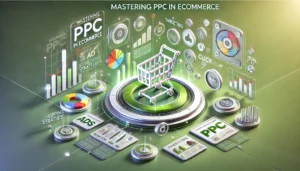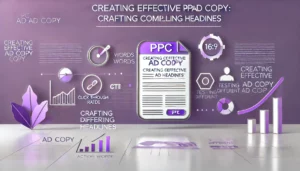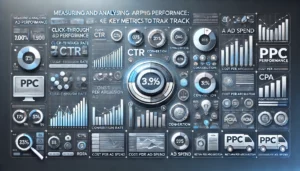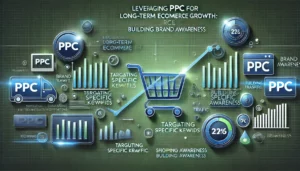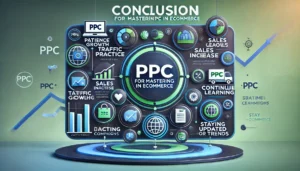Mastering PPC in Ecommerce: A Comprehensive Guide for Beginners

Mastering PPC in Ecommerce: Pay-per-click (PPC) advertising is a fantastic way for online stores to attract more customers. In this guide, we’ll walk you through everything you need to know about PPC in ecommerce. Whether you’re just starting out or looking to improve your current strategies, this guide will help you make the most of your PPC campaigns.
Key Takeaways for Mastering PPC in Ecommerce
- PPC stands for pay-per-click, where you pay only when someone clicks on your ad.
- Google Ads and Facebook Ads are among the most popular platforms for ecommerce PPC.
- You can target your ads to specific groups of people based on their interests and behaviours.
- Setting the right budget and bids is crucial for the success of your PPC campaigns.
- Regularly analysing your PPC performance helps in making data-driven decisions.
Understanding the Basics of PPC in Ecommerce
What is PPC and How It Works
PPC, or Pay-Per-Click, is a digital marketing strategy where you pay a fee each time someone clicks on your ad. Instead of earning visits organically, you buy them. This method is particularly effective for e-commerce because it drives targeted traffic to your product pages, potentially leading to higher sales. PPC is a quick way to get your products in front of potential customers.
Popular PPC Platforms for Ecommerce
Several platforms offer PPC advertising, but some are more popular in the e-commerce space. Google Ads is the most widely used, thanks to its extensive reach and robust analytics. Facebook Ads is another strong contender, offering highly targeted ad placements. Amazon Advertising is also crucial for e-commerce businesses, especially those selling directly on Amazon. Each platform has its own strengths, so it’s essential to choose the one that aligns best with your business goals.
Types of PPC Ads for Online Stores
There are various types of PPC ads you can use for your online store. Search ads appear on search engine results pages when users type in specific keywords. Display ads are shown on various websites and can include images or videos. Shopping ads showcase your products directly in the search results, complete with images and prices. Lastly, social media ads appear on platforms like Facebook and Instagram, targeting users based on their interests and behaviours.
Understanding the different types of PPC ads can help you choose the best strategy for your e-commerce business.
Mastering PPC in Ecommerce: Setting Up Your First PPC Campaign
Setting up your first PPC campaign can seem daunting, but with a clear plan, it becomes manageable. Let’s break it down step by step.
Choosing the Right Platform
The first step is to choose the right platform for your campaign. Popular options include Google Ads PPC and social media ads. Each platform has its strengths, so consider your goals and audience. For instance, Google Adwords PPC is excellent for reaching a broad audience, while social media ads can be more targeted.
Defining Your Target Audience
Knowing your audience is crucial. Define who you want to reach with your ads. Consider factors like age, location, and interests. This helps in creating ads that resonate with your potential customers.
Setting Your Budget and Bids
Budgeting is a critical part of your PPC campaign. Decide how much you’re willing to spend daily or monthly. Then, set your bids for keywords. Overbidding or underbidding can affect your campaign’s success, so find a balance that works for you.
A well-planned budget ensures you don’t overspend while still reaching your target audience effectively.
Creating Effective PPC Ad Copy
Crafting Compelling Headlines
Your headline is the first thing potential customers see, so it needs to grab their attention immediately. Use action words and make sure it speaks directly to the needs or desires of your audience. A strong headline can significantly increase your click-through rate (CTR). Regularly test different headlines to see which ones perform best.
Writing Persuasive Ad Descriptions
Your ad description should expand on your headline and provide more details about your offer. Focus on the benefits rather than the features. Use clear, concise language and include a call to action. Remember, the goal is to make the user want to click on your ad and learn more.
Using Strong Calls to Action
A call to action (CTA) is a crucial part of your ad copy. It tells the user what you want them to do next. Use strong, clear language and make sure your CTA stands out. Phrases like “Buy Now,” “Learn More,” or “Get Started” can be very effective. Make sure your CTA aligns with the goal of your ad.
Regularly performing a Google ads audit can help you identify areas for improvement in your ad copy and overall campaign performance.
Advanced PPC Strategies for Mastering PPC in Ecommerce
Implementing Dynamic Product Ads
Dynamic product ads are a game-changer for eCommerce businesses. These ads automatically show the right products to people who have expressed interest in your website. By leveraging user data, you can create highly personalised ads that boost conversion rates. Dynamic product ads can significantly increase your ROI by targeting the right audience with the right products.
Optimising Product Listing Ads
Product listing ads (PLAs) are essential for showcasing your products directly in search results. To optimise PLAs, focus on high-quality images, accurate product descriptions, and competitive pricing. Use relevant keywords to ensure your products appear in the right searches. Partnering with a PPC eCommerce agency can help you fine-tune these elements for maximum impact.
Utilising A/B Testing for Ad Performance
A/B testing is crucial for understanding what works and what doesn’t in your PPC campaigns. Test different headlines, ad copy, and images to see which combinations yield the best results. A/B testing allows you to make data-driven decisions, improving your ad performance over time.
Partnering with Google ads agencies or Google advertising agencies can provide expert insights and advanced tools to enhance your PPC strategies.
By implementing these advanced PPC strategies, you can elevate your eCommerce business, engage your target audience more effectively, and achieve long-term growth.
Measuring and Analysing PPC Performance
Key Metrics to Track
To get the most out of your PPC campaigns, you need to keep an eye on several key metrics. Click-through rate (CTR) shows how often people click your ad after seeing it. A high CTR means your ad is relevant. Conversion rate tells you how many clicks lead to sales or other desired actions. Cost per acquisition (CPA) helps you understand how much you’re spending to get a new customer. Return on ad spend (ROAS) measures the revenue generated for every dollar spent on advertising. These metrics are crucial for evaluating the success of your campaigns.
Using Analytics Tools
Advanced analytics tools can provide deep insights into your PPC performance. Google Analytics, for example, can track user behaviour on your site after they click your ad. This helps you understand which ads are driving the most valuable traffic. PPC management platforms often offer built-in analytics that can show you real-time data. Using these tools, you can make informed decisions to optimise your campaigns.
Mastering PPC in Ecommerce: Making Data-Driven Decisions
By regularly analysing these metrics, you can pinpoint which aspects of your campaign are driving sales and which need refinement. This ongoing process is crucial for optimizing your PPC efforts and ensuring maximum return. Consider the following table as a simplified snapshot of your campaign’s health:
| Metric | Target Value | Actual Value | Notes |
|---|---|---|---|
| ROAS | 4:1 | 5:1 | Exceeding expectations |
| CTR | 2% | 2.5% | Above industry average |
| CPA | £20 | £18 | Cost-effective |
Regularly managing and analysing the performance of PPC campaigns can provide invaluable insights into your customers’ behavior and preferences. By monitoring key performance indicators (KPIs) over time, you can identify changes in performance, pinpoint the causes, and make necessary adjustments.
A PPC audit can also be beneficial. It provides a comprehensive analysis of your campaign’s health and performance. This should cover key metrics such as CTR, conversion rate, and CPA, which are pivotal in measuring the efficacy of your campaigns. By continually refining your PPC strategy based on campaign data, you can maximise your return on investment, driving more sales and revenue for your ecommerce business.
Common PPC Mistakes and How to Avoid Them
Overbidding or Underbidding
Finding the right bid is crucial for your PPC campaign’s success. Overbidding can drain your budget quickly, while underbidding might result in your ads not being shown at all. Regularly review your bids and adjust them based on performance data to strike the right balance.
Ignoring Negative Keywords
Negative keywords help you filter out irrelevant traffic, ensuring your ads are shown to the right audience. Failing to set negative keywords can lead to wasted ad spend on clicks that won’t convert. Make it a habit to update your negative keyword list frequently.
Failing to Optimise Landing Pages
Your landing page is where the conversion happens. If it’s not optimised, you could lose potential customers. Ensure your landing pages are fast, mobile-friendly, and have clear calls to action. Regularly test different elements to see what works best.
Remember, a well-optimised landing page can significantly improve your conversion rates and overall PPC performance.
Leveraging PPC for Long-Term Ecommerce Growth
Building Brand Awareness
To grow your ecommerce business, you need to build brand awareness. PPC can help you reach a larger audience quickly. By targeting specific keywords, you can ensure your ads appear in front of potential customers who are already interested in your products. This not only drives traffic to your site but also helps establish your brand in the market.
Engaging Repeat Customers
Keeping your existing customers engaged is just as important as finding new ones. Use PPC campaigns to offer special deals or new product announcements to your past customers. This can be done through remarketing ads, which target users who have previously visited your site. Engaging repeat customers can lead to higher lifetime value and increased loyalty.
Scaling Your PPC Campaigns
Once you have a successful PPC campaign, it’s time to scale. Start by increasing your budget gradually and expanding your keyword list. Test different ad formats and placements to see what works best. Scaling your PPC efforts can lead to sustained growth and higher returns over time.
Consistent analysis and improvement of your PPC campaigns are vital for long-term success. By leveraging available resources and learning from your campaigns, you can drive your ecommerce success to new heights.
Conclusion for Mastering PPC in Ecommerce
Mastering PPC in ecommerce is a journey that requires patience, practice, and continuous learning. By understanding the basics, setting clear goals, and regularly optimizing your campaigns, you can effectively drive traffic, increase sales, and grow your brand. Remember, the key to success lies in staying updated with the latest trends and being willing to adapt your strategies. With dedication and the right approach, PPC can become a powerful tool in your ecommerce arsenal. Keep experimenting, learning, and refining your tactics to achieve the best results.
Frequently Asked Questions
What is PPC in ecommerce?
PPC stands for pay-per-click. It’s a common advertising method for online stores. You only pay when someone clicks on your ad, making it a cost-effective way to reach interested customers.
How does PPC work?
In PPC, you choose a platform like Google Ads or Facebook Ads. You set a bid for how much you’ll pay per click. Your ad shows up in search results or on websites, and you pay each time someone clicks on it.
What types of PPC ads are there?
There are several types of PPC ads, including text ads, display ads, and shopping ads. Each type has its own strengths and can be used to reach different audiences.
How do I choose the right PPC platform?
Pick a platform based on where your target audience spends their time. Google Ads and Facebook Ads are popular choices. Consider your budget and the features each platform offers.
What should I consider when setting a PPC budget?
Think about how much you’re willing to spend per click and your overall campaign budget. Start small and adjust based on your campaign’s performance. Track your results to see what’s working.
How can I improve my PPC ad performance?
Write compelling headlines, use strong calls to action, and test different ad copies. Keep an eye on your metrics and make data-driven decisions to optimise your ads.
Author
Search Blog
Free PPC Audit
Subscribe to our Newsletter
The Voices of Our Success: Your Words, Our Pride
Don't just take our word for it. With over 100+ five-star reviews, we let our work-and our satisfied clients-speak for us.
"We have been working with PPC Geeks for around 6 months and have found Mark and the team to be very impressive. Having worked with a few companies in this and similar sectors, I rate PPC Geeks as the strongest I have come across. They have taken time to understand our business, our market and competitors and supported us to devise a strategy to generate business. I value the expertise Mark and his team provide and trust them to make the best recommendations for the long-term."
~ Just Go, Alasdair Anderson

